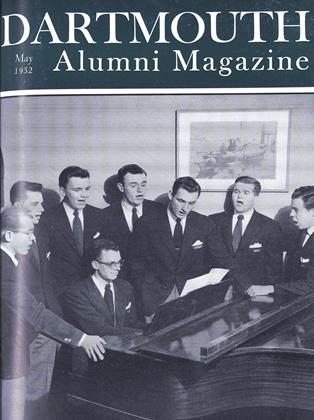READERS of this column may recall that I have long been an admirer of H. St. John Philby, an Englishman who has become a Muslim, and who lives in Jidda in Arabia. He is the greatest living authority writing in English on this important country. The Cornell University Press, under the guidance of Vic Reynolds '27, has brought out a large and sumptuous volume, Arabian Highlands, written by Philby and running to nearly 800 pages.
Philby was the second European to cross the Empty Quarter, the Rub' al Khali of Southern Arabia, making an astounding trip twenty years ago in ninety days of travel over 1,900 miles of empty waste. For the last 350 miles he dared to cross the almost lifeless and waterless regions of Airbia for the first time in history from east to west. In fact Philby has lived in Arabia for well over a quarter of a century, and he is her foremost champion under the able leadership of the great king Ibn Saud, whose court is described in Arabian Highlands.
In the book under consideration he tells of trips made in Arabia in 1932, 1936 and 1937. After emerging from the historic trip mentioned above on March 14, 1932, there was still a 700-mile march to Mecca mostly over uncharted and unexplored country. Arabia may now be a country of tarmac, jeeps, and pipe lines running madly everywhere to bring oil to hungry nations, but it was once a country of fascinating people and desolate wastes. In Arabian Highlands Philby distills the Arabia of countless centuries for you, as Doughty did some 65 years ago in his monumental Arabia Deserta.
Ned Warren '01 gave me a pleasant volume, Four Ducks on a Pond, written by Alice Brainerd Nelson, an old Middleburyite, who in this volume writes seven short sketches which recreate charmingly and with delicate perception an older time in that charming college town. You will long remember Crazy Sarah. Almost any small New Hampshire or Vermont town in the eighties or nineties could match her characters. This book is available from the Vermont Bookshop in Middlebury which published it.
A book of real humility, filled with Christian charity and insight, is Thomas Sugrue's A Catholic Speaks His Mind. I trust that I shall not be accused of bigotry if I recommend this Catholic point of view to Catholics and Protestants alike. His general thesis is that for four hundred years the Church has choked back self-criticism to its detriment, and that religionists of all sects must do something about counteracting the unmistakable drift (finneganism) from spirituality to materialism among all the churches in America. I concur.
It is not often that a Dartmouth professor writes a book of importance and distinction but I am glad to hail the work of Hugh Morrison on early American architecture published by the Oxford Press as belonging in this category. It contains nearly five hundred photographs well integrated with the text, and will interest any alumnus who is curious about our early buildings.
As Harold Nicholson says, "painters almost invariably write strong prose," and this is true of Augustus John in his new "fragments of autobiography" called Chiaroscuro, published recently in London by Jonathan Cape. I have found it a book hard to put down. John is a man who lived by his own unconventional rules, and became the greatest of living portrait painters. He has some interesting things to say about the United States which he knows better than do most Englishmen. He writes charmingly of gypsies, for in many ways he is a Romany himself, and all in all reveals himself to be one of the greatest men of our times.
A monumental life of Henry Irving has appeared. It has been hailed in England as a really great and outstanding English biography, and I would not disagree. However, if you are not interested in the stage, or in actors, it may not hold your unflagging interest. It is written by his grandson, Lawrence Irving.
GUEST EDITOR: Kenneth J. Roman Jr. '52 of Brookline, Mass., who contributed this month's opening section, shown with Budd Schulberg '36 when the latter visited Hanover fhis year.
 View Full Issue
View Full Issue
More From This Issue
-
 Class Notes
Class Notes1918
May 1952 By ERNEST H. EARLEY, DONALD L. BARR, RICHARD A. HOLTON -
 Class Notes
Class Notes1929
May 1952 By F. WILLIAM ANDRES, EDWIN C. CHINLUND, GEORGE B. REDDING -
 Article
ArticleAshurnazirpal's Story
May 1952 By DONALD P. HANSEN '53 -
 Class Notes
Class Notes1917
May 1952 By KARL W. KOENIGER, DONALD BROOKS, HOWARD A. STOCKWELL -
 Article
Article25 Years After
May 1952 By JAMES D. BINDER '52 AND THOMAS L. PAPST '52 -
 Article
ArticleThe Undergraduate Year
May 1952 By KENNETH J. ROMAN JR. '52
HERBERT F. WEST '22
-
 Article
ArticleHANOVER BROWSING
October 1935 By Herbert F. West '22 -
 Article
ArticleHanover Browsing
November 1942 By HERBERT F. WEST '22 -
 Article
ArticleHanover Browsing
January 1943 By HERBERT F. WEST '22 -
 Books
BooksCRIMSON PHILIPPINE JUNGLE
January 1944 By Herbert F. West '22 -
 Article
ArticleHanover Browsing
December 1945 By HERBERT F. WEST '22 -
 Books
BooksNO PLACE TO HIDE
January 1949 By Herbert F. West '22
Article
-
 Article
ArticleSOME INTERESTING GIFTS
November, 1915 -
 Article
ArticlePHI KAPPA PSI COUNCIL WILL MEET AT HANOVER IN APRIL
April 1921 -
 Article
ArticleHelp for Drug Addicts
MARCH 1972 -
 Article
ArticleDartmouth a la Birnbach
JANUARY/FEBRUARY 1985 -
 Article
ArticleGo to College For Nothing!
Nov/Dec 2002 -
 Article
ArticleNoted Townies of the Past and Present
November 1934 By "Old Timer"

